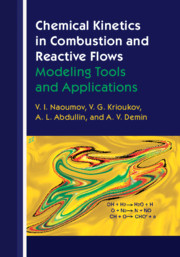Book contents
- Reviews
- Chemical Kinetics in Combustion and Reactive Flows
- Chemical Kinetics in Combustion and Reactive Flows
- Copyright page
- Dedication
- Contents
- Preface
- Acknowledgments
- Nomenclature
- Part I Basic Components of Chemical Nonequilibrium Models
- Part II Mathematical Modeling of Selected Typical Modes of Combustion
- Part III Simulation of Combustion and Nonequilibrium Flows in Propulsion and Power Generation Systems
- 7 Simulation of High-Temperature Heterogeneous Reacting Flows
- 8 Simulation of Two-Phase Flows in Gas Generators of Liquid-Propellant Rocket Engines
- 9 Pressurization of Liquid Propellant Rocket Engine Tanks
- 10 Combustion and Ionization in Spark Ignition Engines
- References
- Index
8 - Simulation of Two-Phase Flows in Gas Generators of Liquid-Propellant Rocket Engines
from Part III - Simulation of Combustion and Nonequilibrium Flows in Propulsion and Power Generation Systems
Published online by Cambridge University Press: 16 August 2019
- Reviews
- Chemical Kinetics in Combustion and Reactive Flows
- Chemical Kinetics in Combustion and Reactive Flows
- Copyright page
- Dedication
- Contents
- Preface
- Acknowledgments
- Nomenclature
- Part I Basic Components of Chemical Nonequilibrium Models
- Part II Mathematical Modeling of Selected Typical Modes of Combustion
- Part III Simulation of Combustion and Nonequilibrium Flows in Propulsion and Power Generation Systems
- 7 Simulation of High-Temperature Heterogeneous Reacting Flows
- 8 Simulation of Two-Phase Flows in Gas Generators of Liquid-Propellant Rocket Engines
- 9 Pressurization of Liquid Propellant Rocket Engine Tanks
- 10 Combustion and Ionization in Spark Ignition Engines
- References
- Index
Summary
Gas–liquid reacting flows seem to be one of the most complex and, at the same time, most prevalent fields of application for mathematical simulation of high-temperature processes. Of these processes, the phenomena are fluid atomization polydispersity and droplet secondary fragmentation, droplet heating and evaporation, turbulence, reactions in the gas phase, the difference in the velocity between the gas and droplet phases (slip velocity), and the multidimensional nature of fluid flow. Such flows make the core of processes proceeding in combustion chambers of air-breathing jet engines [216, 231, 239, 240], rocket engines [160, 215, 228, 229, 241, 242], gas generator driving turbopumps, pressurization systems of the LPRE propellant tanks [160, 215, 228, 241–243], vapor-gas generators [50, 55, 56], afterburners of air-breathing jet engines [216, 231, 239, 240], and different furnaces [58].
- Type
- Chapter
- Information
- Chemical Kinetics in Combustion and Reactive FlowsModeling Tools and Applications, pp. 310 - 333Publisher: Cambridge University PressPrint publication year: 2019

